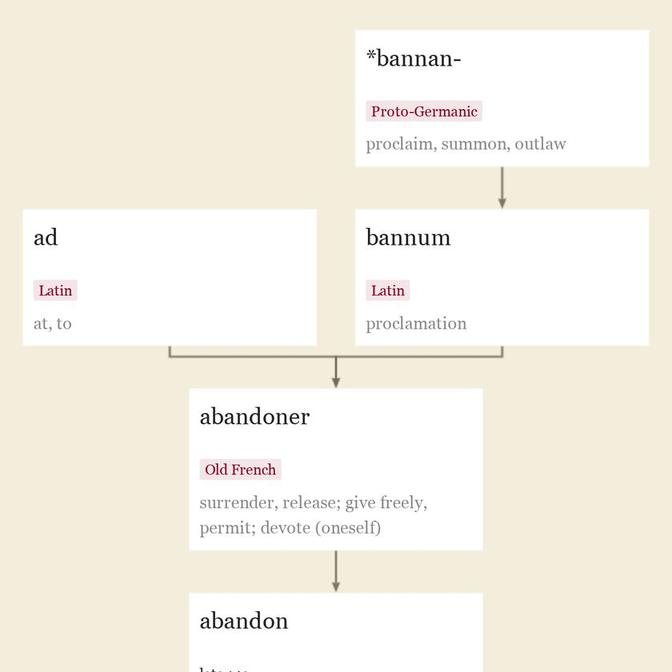amerce (v.)
“任意或自由罚款的惩罚”,1215年,早期的 amercy,盎格鲁-法语 amercier “罚款”,来自 merci “仁慈,恩典”(见 mercy)。法律术语 estre a merci “处于...的掌握之中”(法庭等)被误解为 estre amercié,这是法律术语中副词短语变成动词的一个很好的例子(比较 abandon)。
Frans hom ne seit amerciez pour petit forfet. [Magna Charta]
Frans hom ne seit amerciez pour petit forfet. [大宪章]
相关词汇: Amercement; amerciable/amerceable。
amerce 的相关词汇

14世纪晚期,“彻底放弃(某事物),放弃控制,完全交出”; 也反身,“投降(自己),完全屈服(于宗教、通奸等)”,源自古法语 abandonner“投降,释放; 自由地给予,允许”,也反身,“献身”(12世纪)。
古法语单词由副词短语à bandon“任意地,随意地”形成,由à“在,到”(来自拉丁语 ad; 见 ad-)和 bandon“权力,管辖范围”组成,来自拉丁语 bannum,“公告”,源自法兰克或其他日耳曼语言中的词汇,来自原始日耳曼语* bannan-“宣布,召唤,放逐”(所有这些都是通过公告完成的); 见 ban(v.)。
Mettre sa forest à bandon was a feudal law phrase in the 13th cent. = mettre sa forêt à permission, i.e. to open it freely to any one for pasture or to cut wood in; hence the later sense of giving up one's rights for a time, letting go, leaving, abandoning. [Auguste Brachet, "An Etymological Dictionary of the French Language," transl. G.W. Kitchin, Oxford, 1878]
Mettre sa forest à bandon 是13世纪的封建法律短语= mettre sa forêt à permission,即自由地向任何人开放牧场或砍伐木材; 因此,后来的意义是暂时放弃自己的权利,放手,离开,放弃。[奥古斯特·布拉谢(Auguste Brachet),《法语词源词典》,G.W. Kitchin 译,牛津,1878年]
“离开,抛弃,遗弃(需要某人或某物)”的意思来自15世纪晚期。相关: Abandoned; abandoning。
从词源上讲,这个词带有“把(某物)置于他人控制之下”的意义,这个词最早出现在英语中是作为副词(13世纪中期),意思是“在(某人)的控制下”,因此也是“不受限制的”。
Again, as that which is placed at the absolute command of one party must by the same act be entirely given up by the original possessor, it was an easy step from the sense of conferring the command of a thing upon some particular person to that of renouncing all claim to authority over the subject matter, without particular reference to the party into whose hands it might come ; and thus in modern times the word has come to be used almost exclusively in the sense renunciation or desertion. [Hensleigh Wedgwood, "A Dictionary of English Etymology," 1859]
同样,由于将某物置于一方的绝对命令之下必然意味着原始持有者完全放弃对主题的权威主张,因此从将某物的命令授予某个特定人物的意义转向了放弃对主题的所有权威主张,而不特别涉及可能接手的一方; 因此,在现代,这个词几乎只用于放弃或背叛的意义。[亨斯利·韦奇伍德(Hensleigh Wedgwood),《英语词源词典》,1859年]
公元12世纪末,指"上帝宽恕他的生灵的罪过",源自古法语 mercit, merci (9世纪)的"报酬,礼物; 仁慈,恩惠,怜悯",来自拉丁语 mercedem (主格 merces) 的"工资、报酬、薪水、雇佣" (在通俗拉丁语中为"喜爱、怜悯",在中世纪拉丁语中为"感谢; 恩典"),来源于 merx (属格 mercis)的"商品、货物" (参见 market (名词))。在教会拉丁文(公元6世纪)中,它被特定应用于那些对无助者和那些不会得到报答的人所表现出来的天堂奖励。
早在13世纪初,"宽恕或表现同情的性格"的意义就已经有了确凿证据。"忍耐或仁慈的行为或行使"的意义源于公元1300年左右。作为感叹词的用法,可以追溯到13世纪中期(表示 may God have mercy 、have mercy on me 等的简写形式)。许多英语词义在法语中早已出现,但在法语中,该词基本上已被 miséricorde 所取代,除了作为一种表示感谢的词。"自由裁量的行动"的意义(如在 at (one's) mercy 中)可追溯至14世纪中叶。Seat of mercy "约柜的金盖"(1530),因此指"上帝的宝座",是丁道尔对卢德 gnadenstuhl 的借译,它不太准确地翻译了拉丁语 propitiatorium,,并最终翻译了希伯来语 kapporeth,该词的字面含义为"挽回祭坛"。